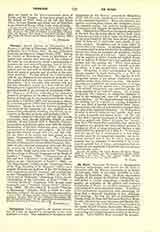

Derogation (Lat. derogatio), the partial revocation of a law, as opposed to abrogation or the total abolition of a law. This definition of derogation firstintroduced by the Roman jurisconsult Modestinus (XVI, 102, De verb. significatione) was soon adopted in the canonical legislation. Even yet, however, derogation in a loose sense means also abrogation, hence the common saying: Lex posterior derogat priori, i.e. a subsequent law imports the abolition of a previous one. Dispensation differs from derogation principally in the fact that the latter affects the law itself which is thereby partially revoked, while the former affects the persons bound by the law, from whose obligation some of them are in particular cases totally or partially released. Derogation may be made either by written law or by custom. In the first instance legislative competency is alone required for its validity; in the second case there are requisite all conditions needed for the introduction of a custom. Again, derogation may be express or direct if made by explicit words; tacit or indirect if effected by a law partially incompatible with the existing one. When done without just motive and by the superior himself it is simply illicit; it is also invalid when done by his delegate. Derogation is often accomplished by special clauses inserted in papal documents, e.g. Non obstantibus etc. (see Papal Rescripts). The absence of such derogatory clauses as are always employed in papal rescripts makes them defective in form. The following rules are helpful for the interpretation of derogations: (I) Apart from special cases, derogations are to be strictly interpreted, any correction of the law being regularly of an “odious” nature. (2) A simple derogation, that imposes no obligation contrary to that of the existing law, does not require a formal promulgation. (3) No clause expressly derogatory of the existing law is requisite in making derogations from any kind of general ecclesiastical laws; exception is made only when it is proposed to derogate from the rules of the Apostolic Chancery. (4) Derogations couched in general terms are not upheld; they must be made in specific and formal terms. (5) The rule of law that a special enactment is derogatory of the previous general one (Generi derogatur per speciem; Reg. 34 in VI) means that a particular law which is a derogation of a general one must always produce its derogatory effect, it being immaterial whether it was issued before the general law or after it. In the latter case the special law is maintained as it was intentionally made by the competent superior; nor in the former instance does it lose its value, because the superior had no intention of abolishing it by a subsequent general law, it being a presumption that superiors are not cognizant of particular laws or customs (see Custom (in Canon Law); Law).
S. LUZIO

